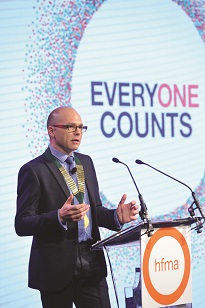Comment / Brothers in arms
Those of you who know me will understand that I am very excited by the news that the Brownlee Brothers – Olympic medal-winning triathletes and former world champions – will close this year’s HFMA annual conference in December.
Triathlon is a brutal sport that requires mental toughness as well as physical strength and mastered technique. To swim, cycle and run in a single long-distance competitive event is not for the faint-hearted.

In our own game, we also have a triple aim: better health, better care and value for money. And in recent years we have increasingly discovered that system collaboration is the binding force for effective patient services.
In that sense, success has become a team game, where whole systems need to work together to avoid sub-optimal outcomes for service users, who should not be concerned with organisational boundaries.
We will all have our favourite sporting memories. Witnessing Alistair Brownlee forgo his individual race to carry his exhausted younger brother Jonny over the finishing line at the Cozumel Grand Finale last year, is one that’s hard to beat.
The race was gone and getting to the finish line was the fastest route to medical attention – in a split second nothing else mattered.
I can think of no better metaphor to illustrate how, despite best plans, sometimes the margin between success and failure can be so narrow that the definition of success changes on the journey.
In our world, organisational recovery plans are the consequence of actual performance falling short of carefully planned assumptions. Increasingly, sharing risk (and reward) across whole health and care systems is seen as the future. But old habits may be hard to break.
How could each party assure itself that others had done everything within their gift to do what they said they would do – effectively controlling their own operating cost – before seeking a system offset?
In Dorset, despite having agreed a ‘one NHS’ approach to delivering the aggregate of individual financial control totals, putting this to the test is something we are all desperately keen to avoid.
Having delivered within agreed planning parameters for each of the last three years since coming out of financial special measures, Poole Hospital reported adverse performance against plan for both June and July. The single biggest reason for this relates to an increase in the cost of pay, with an unforeseen hike in our reliance on premium rate agency nursing staff.
There are many factors at play, but with such a fine margin between success and failure, subtle changes can move you to the wrong side of the line. Our run-rate is enough to confirm that, without corrective action, maintaining a positive cash balance will be an even bigger challenge later in the year.
Time will tell whether the corrective action we have taken will be enough to move us back into planned run-rate by the end of the summer.
Without any doubt, Poole Hospital will do everything and anything to continue to self-finance the high-quality services that we are proud to deliver for Dorset. After all, delivery maintains our autonomy, and ultimately secures our licence to continue to operate.
We are now approaching the business end of the financial year – the time when we define success in the current period and plan for success in the next.
It seems to me that, as we move sensibly towards a greater system focus, increasingly in the future we may need to look to our metaphorical siblings for the support needed to continue to cross the line again and again.
However, individual trusts must play their part if whole systems are to succeed together.
Contact the president on [email protected]
Related content
We are excited to bring you a fun packed Eastern Branch Conference in 2025 over three days.
This event is for those that will benefit from an overview of costing in the NHS or those new to costing and will cover why we cost and the processes.